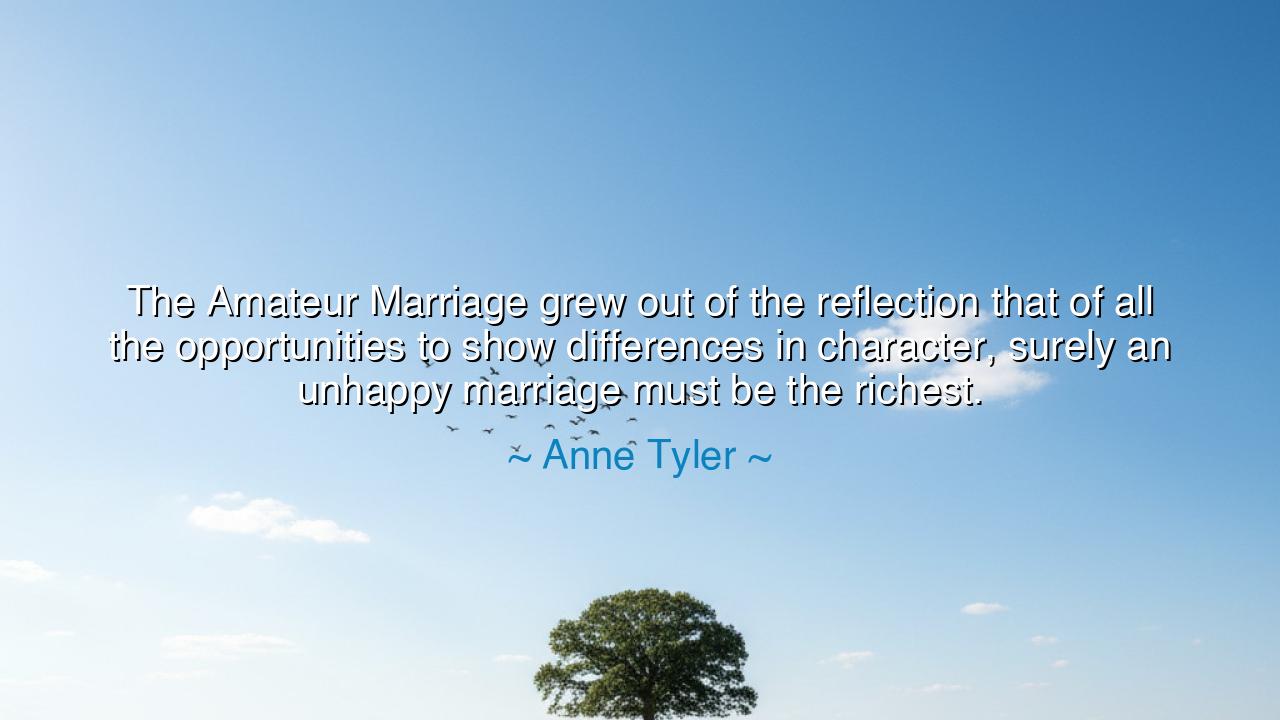
The Amateur Marriage grew out of the reflection that of all the
The Amateur Marriage grew out of the reflection that of all the opportunities to show differences in character, surely an unhappy marriage must be the richest.






In the grand theatre of human existence, marriage is perhaps the stage where the most profound differences in character are revealed. Anne Tyler, in her reflection on the nature of marriage, states: “The Amateur Marriage grew out of the reflection that of all the opportunities to show differences in character, surely an unhappy marriage must be the richest.” These words are not merely an observation, but a deep truth about the complexities of human relationships. A marriage—especially an unhappy one—offers a mirror into the souls of those who enter it. It is here, in the shared struggles and silent battles, that the most fundamental aspects of character come to light.
The ancients understood the gravity of such unions. In Greek tragedy, the conflicts within a marriage often served as the crucible in which the hero’s flaws were exposed. Consider the tragic tale of Medea, who, despite her profound love for her husband, Jason, was driven to unspeakable acts of revenge when betrayed. Medea's marriage was an intense exploration of loyalty, betrayal, and the darkness that can lie within the human heart. Through this union, we see not only the complexity of human emotion but the destructive power of an unhappy and broken marriage. The difference in character between the two partners—their strengths and weaknesses, their ideals and failings—was magnified in their mutual suffering. In this sense, Tyler's insight echoes the wisdom of the ancients: the most revealing character flaws emerge in the heat of personal conflict, particularly when the stakes are as high as the heart.
Tyler’s notion of the “Amateur Marriage” is an intriguing one. She suggests that a marriage in which both parties are still learning, still trying to find their way, is the place where character is most exposed. Amateur, in this sense, does not imply a lack of skill, but rather a rawness, a genuineness that comes from unrefined attempts at understanding and commitment. Such a union, however imperfect, is rich in its portrayal of human nature. It is the difference between two people, striving to make something work—sometimes succeeding, sometimes failing—that offers the clearest view of their true selves. Character, in this light, is not a static thing but a dynamic force that reveals itself over time, especially under pressure.
Consider the story of King Henry VIII and Catherine of Aragon. Their marriage, once rooted in love and political alliance, devolved into a bitter and heartbreaking struggle that exposed the fundamental differences in their characters. Henry’s desire for an heir, his political ambitions, and his personal insecurities clashed with Catherine’s unwavering sense of duty and devotion. The unhappiness that grew from these tensions revealed Henry’s deeper flaws—his impulsiveness, his need for control, and his disregard for the sanctity of the vows he had made. Catherine, on the other hand, demonstrated the strength of her character through her steadfastness, her ability to endure, and her refusal to relinquish her sense of honor. Their unhappy marriage exposed the contrast in their character—a contrast that shaped the course of history, leaving behind a legacy of pain, but also revealing the depths of their respective souls.
Tyler’s reflection, then, is not just about the unhappiness of marriage but about the human condition itself. In every partnership, especially those that falter, there is a chance to examine what lies beneath the surface. It is easy to be kind, generous, and noble in times of ease, but it is the moments of conflict and difficulty that truly reveal the character of a person. In a marriage, where emotions are raw and stakes are high, the hidden weaknesses and strengths of both partners come to the forefront. The suffering of an unhappy marriage provides a fertile ground for the revelation of what is truly in the heart.
The lesson to take from Tyler’s words is clear: it is in our most challenging relationships that our true character is most fully exposed. When we face adversity, whether in marriage or in any other area of life, we reveal not only the person we are but also the person we are becoming. The ability to learn from these challenges, to grow in the face of difficulty, and to see the difference in character that such adversity brings, is the mark of wisdom. Character is not something we are born with, but something we forge in the crucible of life’s trials.
So, let us look at our own relationships—not with judgment but with understanding. Let us recognize that the unhappiness we face in our own unions, whether romantic or otherwise, is not a sign of failure, but a rich opportunity to learn about ourselves and others. Let us approach these challenges with humility and a willingness to grow. And let us be mindful of the power of character—how it is revealed in moments of strife, and how it can be nurtured into something beautiful and enduring. In this way, we honor the wisdom of Tyler and the ancients, seeing in every trial the chance to refine and build the best parts of ourselves.






AAdministratorAdministrator
Welcome, honored guests. Please leave a comment, we will respond soon